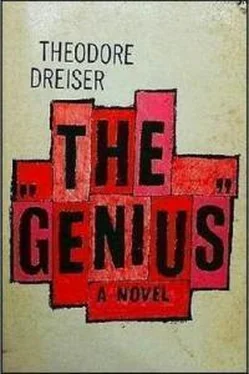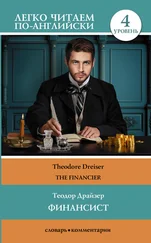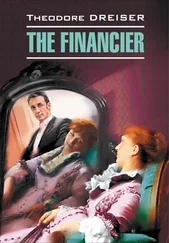Теодор Драйзер - The Genius
Здесь есть возможность читать онлайн «Теодор Драйзер - The Genius» весь текст электронной книги совершенно бесплатно (целиком полную версию без сокращений). В некоторых случаях можно слушать аудио, скачать через торрент в формате fb2 и присутствует краткое содержание. Год выпуска: 2014, Издательство: epubBooks Classics, Жанр: Классическая проза, на английском языке. Описание произведения, (предисловие) а так же отзывы посетителей доступны на портале библиотеки ЛибКат.
- Название:The Genius
- Автор:
- Издательство:epubBooks Classics
- Жанр:
- Год:2014
- ISBN:нет данных
- Рейтинг книги:4 / 5. Голосов: 1
-
Избранное:Добавить в избранное
- Отзывы:
-
Ваша оценка:
- 80
- 1
- 2
- 3
- 4
- 5
The Genius: краткое содержание, описание и аннотация
Предлагаем к чтению аннотацию, описание, краткое содержание или предисловие (зависит от того, что написал сам автор книги «The Genius»). Если вы не нашли необходимую информацию о книге — напишите в комментариях, мы постараемся отыскать её.
The Genius — читать онлайн бесплатно полную книгу (весь текст) целиком
Ниже представлен текст книги, разбитый по страницам. Система сохранения места последней прочитанной страницы, позволяет с удобством читать онлайн бесплатно книгу «The Genius», без необходимости каждый раз заново искать на чём Вы остановились. Поставьте закладку, и сможете в любой момент перейти на страницу, на которой закончили чтение.
Интервал:
Закладка:
The Genius
Theodore Dreiser
Epigraph
"Eugene Witla, wilt thou have this woman to thy wedded wife, to live together after God's ordinance in the holy estate of matrimony? Wilt thou love her, comfort her, honour her, and keep her in sickness and in health; and forsaking all others, keep thee only unto her, so long as ye both shall live?"
"I will."
Book I
Youth
Chapter I
This story has its beginnings in the town of Alexandria, Illinois, between 1884 and 1889, at the time when the place had a population of somewhere near ten thousand. There was about it just enough of the air of a city to relieve it of the sense of rural life. It had one street–car line, a theatre,—or rather, an opera house, so–called (why no one might say, for no opera was ever performed there)—two railroads, with their stations, and a business district, composed of four brisk sides to a public square. In the square were the county court–house and four newspapers. These two morning and two evening papers made the population fairly aware of the fact that life was full of issues, local and national, and that there were many interesting and varied things to do. On the edge of town, several lakes and a pretty stream—perhaps Alexandria's most pleasant feature—gave it an atmosphere not unakin to that of a moderate–priced summer resort. Architecturally the town was not new. It was mostly built of wood, as all American towns were at this time, but laid out prettily in some sections, with houses that sat back in great yards, far from the streets, with flower beds, brick walks, and green trees as concomitants of a comfortable home life. Alexandria was a city of young Americans. Its spirit was young. Life was all before almost everybody. It was really good to be alive.
In one part of this city there lived a family which in its character and composition might well have been considered typically American and middle western. It was not by any means poor—or, at least, did not consider itself so; it was in no sense rich. Thomas Jefferson Witla, the father, was a sewing machine agent with the general agency in that county of one of the best known and best selling machines made. From each twenty, thirty–five or sixty–dollar machine which he sold, he took a profit of thirty–five per cent. The sale of machines was not great, but it was enough to yield him nearly two thousand dollars a year; and on that he had managed to buy a house and lot, to furnish it comfortably, to send his children to school, and to maintain a local store on the public square where the latest styles of machines were displayed. He also took old machines of other makes in exchange, allowing ten to fifteen dollars on the purchase price of a new machine. He also repaired machines,—and with that peculiar energy of the American mind, he tried to do a little insurance business in addition. His first idea was that his son, Eugene Tennyson Witla, might take charge of this latter work, once he became old enough and the insurance trade had developed sufficiently. He did not know what his son might turn out to be, but it was always well to have an anchor to windward.
He was a quick, wiry, active man of no great stature, sandy–haired, with blue eyes with noticeable eye–brows, an eagle nose, and a rather radiant and ingratiating smile. Service as a canvassing salesman, endeavoring to persuade recalcitrant wives and indifferent or conservative husbands to realize that they really needed a new machine in their home, had taught him caution, tact, savoir faire. He knew how to approach people pleasantly. His wife thought too much so.
Certainly he was honest, hard working, and thrifty. They had been waiting a long time for the day when they could say they owned their own home and had a little something laid away for emergencies. That day had come, and life was not half bad. Their house was neat,—white with green shutters, surrounded by a yard with well kept flower beds, a smooth lawn, and some few shapely and broad spreading trees. There was a front porch with rockers, a swing under one tree, a hammock under another, a buggy and several canvassing wagons in a nearby stable. Witla liked dogs, so there were two collies. Mrs. Witla liked live things, so there were a canary bird, a cat, some chickens, and a bird house set aloft on a pole where a few blue–birds made their home. It was a nice little place, and Mr. and Mrs. Witla were rather proud of it.
Miriam Witla was a good wife to her husband. A daughter of a hay and grain dealer in Wooster, a small town near Alexandria in McLean County, she had never been farther out into the world than Springfield and Chicago. She had gone to Springfield as a very young girl, to see Lincoln buried, and once with her husband she had gone to the state fair or exposition which was held annually in those days on the lake front in Chicago. She was well preserved, good looking, poetic under a marked outward reserve. It was she who had insisted upon naming her only son Eugene Tennyson, a tribute at once to a brother Eugene, and to the celebrated romanticist of verse, because she had been so impressed with his "Idylls of the King."
Eugene Tennyson seemed rather strong to Witla père, as the name of a middle–western American boy, but he loved his wife and gave her her way in most things. He rather liked the names of Sylvia and Myrtle with which she had christened the two girls. All three of the children were good looking,—Sylvia, a girl of twenty–one, with black hair, dark eyes, full blown like a rose, healthy, active, smiling. Myrtle was of a less vigorous constitution, small, pale, shy, but intensely sweet—like the flower she was named after, her mother said. She was inclined to be studious and reflective, to read verse and dream. The young bloods of the high school were all crazy to talk to Myrtle and to walk with her, but they could find no words. And she herself did not know what to say to them.
Eugene Witla was the apple of his family's eye, younger than either of his two sisters by two years. He had straight smooth black hair, dark almond–shaped eyes, a straight nose, a shapely but not aggressive chin; his teeth were even and white, showing with a curious delicacy when he smiled, as if he were proud of them. He was not very strong to begin with, moody, and to a notable extent artistic. Because of a weak stomach and a semi–anæmic condition, he did not really appear as strong as he was. He had emotion, fire, longings, that were concealed behind a wall of reserve. He was shy, proud, sensitive, and very uncertain of himself.
When at home he lounged about the house, reading Dickens, Thackeray, Scott and Poe. He browsed idly through one book after another, wondering about life. The great cities appealed to him. He thought of travel as a wonderful thing. In school he read Taine and Gibbon between recitation hours, wondering at the luxury and beauty of the great courts of the world. He cared nothing for grammar, nothing for mathematics, nothing for botany or physics, except odd bits here and there. Curious facts would strike him—the composition of clouds, the composition of water, the chemical elements of the earth. He liked to lie in the hammock at home, spring, summer or fall, and look at the blue sky showing through the trees. A soaring buzzard poised in speculative flight held his attention fixedly. The wonder of a snowy cloud, high piled like wool, and drifting as an island, was like a song to him. He had wit, a keen sense of humor, a sense of pathos. Sometimes he thought he would draw; sometimes write. He had a little talent for both, he thought, but did practically nothing with either. He would sketch now and then, but only fragments—a small roof–top, with smoke curling from a chimney and birds flying; a bit of water with a willow bending over it and perhaps a boat anchored; a mill pond with ducks afloat, and a boy or woman on the bank. He really had no great talent for interpretation at this time, only an intense sense of beauty. The beauty of a bird in flight, a rose in bloom, a tree swaying in the wind—these held him. He would walk the streets of his native town at night, admiring the brightness of the store windows, the sense of youth and enthusiasm that went with a crowd; the sense of love and comfort and home that spoke through the glowing windows of houses set back among trees.
Читать дальшеИнтервал:
Закладка:
Похожие книги на «The Genius»
Представляем Вашему вниманию похожие книги на «The Genius» списком для выбора. Мы отобрали схожую по названию и смыслу литературу в надежде предоставить читателям больше вариантов отыскать новые, интересные, ещё непрочитанные произведения.
Обсуждение, отзывы о книге «The Genius» и просто собственные мнения читателей. Оставьте ваши комментарии, напишите, что Вы думаете о произведении, его смысле или главных героях. Укажите что конкретно понравилось, а что нет, и почему Вы так считаете.









